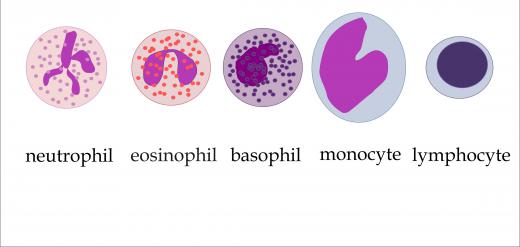What are Lymphocytes?
Lymphocytes are a type of white blood cell, which are an important part of the immune system. Lymphocytes can defend the body against infection because they can distinguish the body’s own cells from foreign ones. Once they recognize foreign material in the body, they produce chemicals to destroy that material.
Two types of lymphocyte are produced in the bone marrow before birth. B lymphocytes, also called B cells, stay within the bone marrow until they are mature. Once mature, they spread throughout the body and concentrate in the spleen and lymph nodes. T lymphocytes, or T cells, leave the bone marrow and mature in the thymus, a gland found in the chest. Only mature lymphocytes can carry out immune responses.

All lymphocytes are capable of producing chemicals to fight foreign molecules. Any molecule recognized by the body as foreign is called an antigen. A lymphocyte, whether B or T, is specific for only one kind of antigen. Only when the appropriate antigen is encountered does the cell become stimulated.
There are two main types of T lymphocytes and each plays a separate role in the immune system. Killer T cells search the body for cells infected by antigens. When a killer T cell recognizes an antigen attached to a cell of the body, it attaches itself to the surface of the infected cell. It then secretes toxic chemicals into the cell, killing both the antigen and the infected cell.

T helper cells release a chemical, called a cytokine, when activated by an antigen. These chemicals then stimulate B lymphocytes to begin their immune response. When a B cell is activated, it produces proteins that fight antigens, called antibodies. Antibodies are specific for only one antigen, so there are many types of B cells in the body.
The first time an antigen is encountered, the primary immune response, the reaction is slow. After being stimulated by the T helper cells, the B cells begin to replicate and become either plasma cells or memory cells. Plasma cells produce antibodies to fight the antigen, but the antigen also has time to multiply. The effect of the antigen on the body's cells is what causes symptoms of the disease. Initially, it can take days or even weeks for enough antibodies to be produced to defeat the invading material.

Plasma cells continue to multiply and produce antibodies during the infection, but do not live very long. Plasma cells die within a few days. Antibodies remain in the system for a bit longer, but usually breakdown within a week. Memory cells remain in the body for much longer than plasma cells and antibodies, often years. They are important for providing immunity.

If the antigen infects the body again, the memory cells respond almost immediately. They begin to multiply right away and become plasma cells. This causes antibodies to be produced practically instantaneously. In these later infections, the response is so quick that symptoms can be prevented. This is known as the secondary immune response and is what gives people immunity to a disease.
AS FEATURED ON:
AS FEATURED ON:
















Discussion Comments
What are the two types of cells that lymphocytes produce?
The human immune system is just so complicated. I have read some studies recently suggesting too that different people's immunities might work entirely differently, though there is no real explanation as to why; people are just wired differently. There is no real answer, at least not so far, but that seems to be the reason why different people have success with different treatments for cancer and other serious conditions, even people who seem to be similar in terms of health, age, et cetera.
This explains why people with leukemia have fairly positive success with bone marrow transplants, though also why this does not always solve the problem.
Post your comments